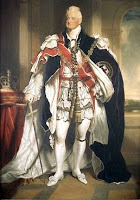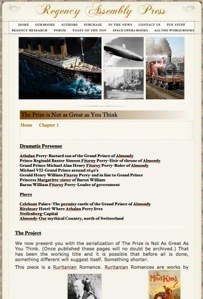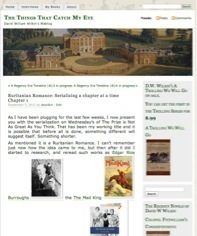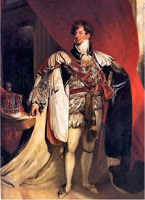D.W. Wilkin's Blog, page 338
October 23, 2012
A Regency Era Personality–Caroline of Brunswick
The preliminary work on the Timelines of the Regency Era has now been presented. 50 years of happenings, events, births and deaths of prominent figures. It is not over. There are probably a good thousand more events to be recorded. In fact, at this point only those details through 1802 have been added into the Timeline.
The rest takes a great deal of editing, as well as searching and placing the graphics. The first years of 1787 to 1801 can all be found at Regency Assembly Press’ Timeline page
There are a lot of pictures shown there. It will add to your visualization of the Regency. But now, what to include in my daily posts. For months now we have had something new every day, and by the number of hits we are not getting, there is a small following.
Soon we will have an Edwardian Timeline, but for now, Regency Personalities is something I have thought to start on.
Over the next few days I thought it might be useful for me to have a guide.
Amongst other royalty and notables will be:
Queen Adelaide
Dorothea Jordan
Maria Fitzherbert
Lord Byron
Shelley
Keats
Lady Caroline Lamb
Georgiana, Duchess of Devonshire
Charles James Fox
Richard Brinsley Sheridan
Edmund Kean
Wellington (the Military man)
Nelson
Howe
St. Vincent
Packenham
Constable
Lawrence
Cruikshank
Gillray
Rowlandson
Patronesses of Almacks
Emily Lamb, Lady Cowper
Amelia Stewart, Viscountess Castlereagh
Sarah Villiers, Countess of Jersey
Maria Molyneux, Countess of Sefton
Mrs. Drummond Burrell
Dorothea Lieven, Countess de Lieven, wife of the Russian Ambassador
Countess Esterhazy, wife of the Austrian Ambassador
Previous Notables (Click to see the Blog):
Today, the next personality of our period, Princess Caroline of Brunswick, wife of George IV. Much of this is work I have done for the English Historical Fiction Authors, of which I am a member of.
Caroline Amelia Elizabeth of Brunswick-Wolfenbuttel
May 17th 1768 to August 7th 1821
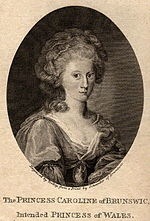
Caroline of Brunswick and her story is not a happy one to add to the Monarchy of the Regency. She was already 26 when engaged to George, the Prince of Wales (George IV) and the word was she was not pure and chaste then. In that time, a man might have had affairs, and a Prince (George had married Maria Fitzherbert, though not according the law and Royal Marriages Act of 1772) George was also a man very much in debt and so agreed to marrying a princess for money. Whether he married Caroline or another, all was doomed to failure for he truly did love Maria Fitzherbert .
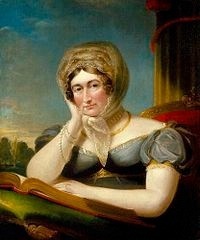
According to Prinny, they slept together three times and happily conceived Charlotte. Once she was born, George broke with Caroline never to see her again. He could not stand her. By 1806 rumors held that Caroline had lovers and an illegitimate child. Even though George was once again living with his mistress, the succession could be placed in jeopardy should Caroline become pregnant. (In Jewish Law, the birthright is always through the mother. It is quite a certainty who a child’s mother is. A father, not so assured until now with genetic paternity testing.)
The rumors led to the Delicate Investigation, which found no foundation for the allegations. Caroline wanted then to return to Brunswick. Her access to Charlotte had been cut. Napoleon however thwarted plans to flee to the continent. He had overrun Brunswick and Caroline’s mother and her brother the Duke fled to England. After the conclusion of the Delicate Investigation, Caroline was able to see Charlotte only once a week.
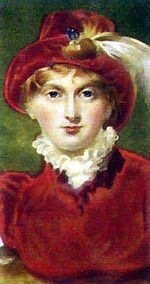
In August of 1814, Caroline left England. Over the course of her travels abroad she met Bartolomeo Pergami, had him hired as a servant of her household, rise to the head of her household. Got him ennobled with the Order of Malta and a barony, and made him her lover.
Charlotte knew what she was doing. She made it a condition of her marriage negotiations to William of Orange when she came of age, that Caroline would forever be welcome in her house. Something that William and George both were against. It allowed Charlotte to transfer her cap from William to Leopold of Saxe-Coburg-Saalfeld.
Charlotte died just after having a stillborn son in November 1817. George would not write Caroline of the tragedy. Leopold had to do so.
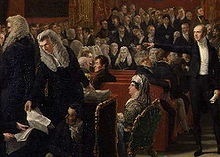
Now George wanted a divorce. By 1819 Caroline was willing to do so for money. There was an issue over having Caroline admit to adultery though she was living openly with Pergami. At this time one could not get a divorce without such evidence and admittance to it.
Then in 1820 George III died, and Caroline, who would not have any power through her daughter since Charlotte had died, could be her husband’s Queen. George IV really wanted to be rid of her and had been trying to do so since days after they had married, twenty-five hears before. Caroline though rejected his latest offer and in June returned to England.
George now (already ridiculed so often by the public) presented to Parliament evidence gathered from Caroline’s Milan years abroad. 15 peers looked at it and found it scandalous. The Pains and Penalties Bill of 1820 was introduced to strip Caroline of the title of Queen Consort and dissolve the marriage. It passed the House of Lords, but was not sent to the House of Commons. At the end of the trial, Caroline accepted George’s deal to get rid of her.
Yet at the Coronation of George on July 19th 1821, she was there once more to cause him consternation. She was refused entry to Westminster Abbey at both doors, and then had bayonets placed under her chin to keep her out. The Deputy Lord Chamberlain spammed the doors in her face.
That very night Caroline fell ill. Over the next three weeks she had more pain and deteriorated. She put her affairs in order and then died on August 7th. Sensing trouble when her funeral cortège was to go through the city, it was rerouted. Still trouble did come and the army drew and shot. Two citizens were killed. The cortège was returned to it’s original path through the city.
* *
Napoleon and Caroline both perished in 1821. George IV heard of Napoleon’s death while waiting to hear of Caroline’s. From Lord Holland and Sir William Fraser we have the telling of the story:
‘I have, Sir, to congratulate you: your greatest enemy is dead.’
‘Is she, by God?’
(DWW-I used this a few days ago when writing up Prinny. But now having researched Caroline, I can see how truly terrible things were for them both in this marriage, and how neither tried to make it good. Caroline, having given George an heir, and have irreconcilable differences, should have found a way to divorce the man and have a life. Becoming Queen was certainly not worth the misery, and even should she have been Queen, she did not survive the coronation very long at all.)
* *


October 22, 2012
A Regency Era Personality–Charlotte of Mecklenburg Strelitz (Queen Charlotte)
The preliminary work on the Timelines of the Regency Era has now been presented. 50 years of happenings, events, births and deaths of prominent figures. It is not over. There are probably a good thousand more events to be recorded. In fact, at this point only those details through 1802 have been added into the Timeline.
The rest takes a great deal of editing, as well as searching and placing the graphics. The first years of 1787 to 1801 can all be found at Regency Assembly Press’ Timeline page
There are a lot of pictures shown there. It will add to your visualization of the Regency. But now, what to include in my daily posts. For months now we have had something new every day, and by the number of hits we are not getting, there is a small following.
Soon we will have an Edwardian Timeline, but for now, Regency Personalities is something I have thought to start on.
Over the next few days I thought it might be useful for me to have a guide.
Amongst other royalty and notables will be:
The not Queen Caroline
Queen Adelaide
Dorothea Jordan
Maria Fitzherbert
Lord Byron
Shelley
Keats
Wellington (the Military man)
Nelson
Constable
Lawrence
Previous Notables (Click to see the Blog):
Today, the next personality of our period, Queen Charlotte, wife of George III. Much of this is work I have done for the English Historical Fiction Authors, of which I am a member of.
Sophia Charlotte
May 19th 1744 to November 17th 1818
After the current Duke of Edinburgh, Phillip, Charlotte is the longest serving consort to a
British Monarch. Over 57 years. She gave her husband, George III fifteen children. Nine boys, six girls. Two kings.
Charlotte was a patroness of the arts, known to Bach’s youngest son and to Mozart. She was also an amateur botanist and help to expand Kew Gardens.
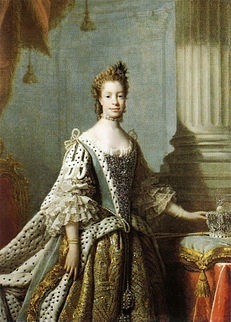
She was born the youngest daughter of a small northern German Duchy, her father the Duke of Mecklenburg-Strelitz and Prince of Mirow. (Unlike her one day boorish daughter-in-law Caroline, Charlotte was given an admirable education and brought up as a lady.) A good education, and religious upbringing made her a solid candidate for George III. Colonel Graeme of George’s court discovered her when she was 17 and though not a beauty, had admirable qualities including ‘white and even teeth.’
By July of 1761 George had settled on her (though he had been passionately in love with two others before her.) By August the Princess was on her way to England. A thunderstorm set fire to several trees on their route. And a storm at sea caused a normal three day passage to take nine days. (A biographer pointed out that during the storm, Charlotte was fine, while all her attendants were sea-sick.)
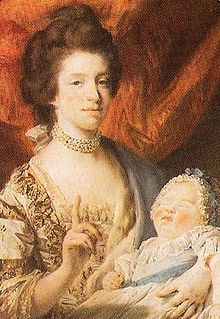
She met George III on September 7th 1761 and they were married September 8th. August 12th, 1762, George (Later King George IV) was born. The first years as queen though, she as so many other women, had to contend with a strong willed mother-in-law (Augusta of Saxe-Gotha) who exerted a great deal of control over George III.

Thirteen of the fifteen children that Charlotte was to have lived to adulthood. After the birth of George, the royal family moved to Buckingham House which would later be remodeled and renamed Buckingham Palace.
Charlotte was an admirer of music and Mozart (aged 8 at the time) came to England and on May 19th, 1764, appeared at court and played and sang, including a duet with Charlotte. The music master to the Queen was the 11th son of Bach, Johanne Christian. Mozart later had his Opus 3 dedicated to the queen.
Charlotte founded orphanages and a hospital for expectant mothers. She saw to the education of women, including her daughters.
When George was taking with his prophyria, Charlotte was charged legally with his care, but she avoided him since when ill, he was prone to violence.
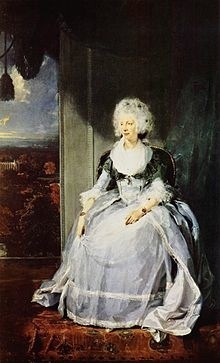
One person, though she never met, that she was friends with was Marie Antoinette. They wrote to each other regularly, obviously having similar concerns. Charlotte was related to be shocked and overwhelmed by the manner of Marie Antoinette’s treatment and murder.
Prinny was at her son, holding her had when she died. He kept her jewels but all the rest of her property was sold at auction. Clothes, furniture, even her snuff.
* *
Charlotte’s nose was not her best point. It had an upward tilt.
From Windsor, in ‘My Hanoverian Ancestors’ we have:
Though later popular, the people when they first saw her shouted ‘Pug! Pug! Pug!’ Caroline, puzzled said, ‘Vat is dat they do say–poog? Vat means poog?’ The Duchess of Ancaster, to whom she had addressed the question replied, ‘It means ‘God bless Your Royal Highness.’
* *
Though not a failing of Charlotte, on their wedding day, the great diamond dropped out of the king’s crown between St. Jame’s and Westminster. It was later seen as heralding the loss of America. (DWW-I should imagine the wags, if the marriage had been a failure, would have said that was what the symbology was.)
* *


October 20, 2012
A Regency Era Personality–Princess Charlotte
The preliminary work on the Timelines of the Regency Era has now been presented. 50 years of happenings, events, births and deaths of prominent figures. It is not over. There are probably a good thousand more events to be recorded. In fact, at this point only those details through 1802 have been added into the Timeline.
The rest takes a great deal of editing, as well as searching and placing the graphics. The first years of 1787 to 1801 can all be found at Regency Assembly Press’ Timeline page
There are a lot of pictures shown there. It will add to your visualization of the Regency. But now, what to include in my daily posts. For months now we have had something new every day, and by the number of hits we are not getting, there is a small following.
Soon we will have an Edwardian Timeline, but for now, Regency Personalities is something I have thought to start on.
Over the next few days I thought it might be useful for me to have a guide.
Amongst other royalty and notables will be:
Queen Charlotte
The not Queen Caroline
Queen Adelaide
Dorothea Jordan
Maria Fitzherbert
Lord Byron
Shelley
Keats
Wellington (the Military man)
Nelson
Today, the next personality of our period, Princess Caroline, daughter of George IV. Much of this is work I have done for the English Historical Fiction Authors, of which I am a member of.
Charlotte Augusta
January 7th 1796 to November 6th 1817
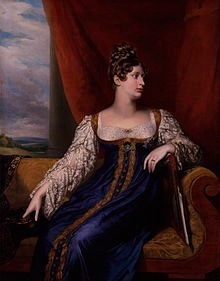
Conceived and raised to one purpose, to be Queen of England. Unfortunately she died while still young.
George IV, Prince of Wales in 1794 was very much in debt.
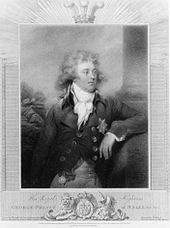
William Pitt the Younger bribed George to take a wife that would ensure the succession. In the running were Louise of Mecklenburg-Strelitz and Caroline of Brunswick. Caroline had a tarnished past, but so too did George who was cohabiting with the great love of his life, Maria Fitzherbert. Lady Jersey (Mother-in-law of the Lady Jersey who was patroness of Almacks) was a mistress of George (she set her cap at him) right before his need for a royal marriage to absolve his crushing debts and urged George to take Caroline for a wife. Lady Jersey did not think she would be much of a rival (and she was right. But wrong about how much George really loved Maria Fitzherbert.)
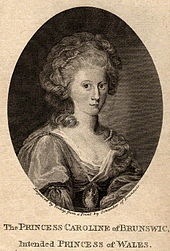
Caroline was George’s first cousin, and yet the Princess was crude and coarse. Nothing as you would imagine a princess to be. On first sight, the parent’s of Charlotte did not like each other. George just prior to the wedding ceremony sent the Duke of Clarence (King William IV) to tell Mrs. Fitzherbert that she was the only woman he would ever love, and then went to marry Caroline drunk.
George said later they had sex precisely three times. One day short of nine months after the wedding Charlotte (named after her grandmother the Queen) was born.
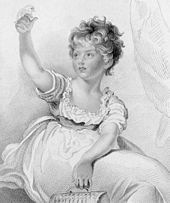
At that time (just weeks after the wedding actually) the royal parents were separated though living at Carlton House. Three days after Charlotte was born George was officially finished with Caroline. George then placed sanctions on Caroline to visit her baby daughter, but the sympathetic staff of Carlton House allowed the Princess to spend time with the baby.
Charlotte was a healthy child. In her early years, she moved to her own residence of Montague House next to Carlton house and here, George Keppel, later the Earl of Albemarle visited often. Friends with the Princess, they noted that crowds often gathered to try and see the Princess. For one lark they went outside to join the crowd, unrecognized.
When Caroline was accused of adultery, ‘the delicate investigation’, Charlotte was not allowed to see her mother, and she obeyed those rules. After the conclusion they were once again able to see one another.
When George, as Regent, became a Tory (DWW-Tories were pro-monarchy and as Regent, he was nearly the monarch so can you blame him for switching?) his daughter supported his old causes, even blowing kisses to Charles Grey, the Whig leader.
Charlotte now, as a budding young woman in the 1810s found that she was under stricter rules than her father had been. She developed infatuations with her own first cousins, George FitzClarence (son of William IV), and then Charles Hesse (son of the Duke of York). FitzClarence was sent off to his regiment. Hesse and the princess had several clandestine meetings. Hesse then was sent off to Spain.
Due to the times, the Napoleonic wars continuing and the map of Europe being carved up, the future Queen of England was not one who could marry where she wanted and so her own fate was being carefully chosen. The Prince of Wales chose William, the son of William IV of Orange. Charlotte liked her cousin, William the Duke of Gloucester. When George IV got wind of that he let his daughter and her paramour both know of his displeasure. Eventually the press heard and wondered whether she would marry “the Orange or the Cheese”, “Slender Billy or Silly Billy”
George arranged for her daughter to meet Slender Billy, the Orange, and Charlotte agreed that she liked him well enough. Negotiations were undertaken to unite the two houses (Again as once before with William and Mary) Everything was agreed and then Charlotte met Prince Leopold of Saxe-Coburg-Saalfeld, also a Lieutenant General of Russian Cavalry.
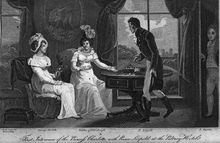
Over the issue of allowing Princess Caroline to visit Charlotte in her house with William, William refused and so the headstrong Princess found her means to break the engagement.
George was angered over this and ordered her to Queen Charlotte at Windsor. But the Princess fled into the street, where a citizen helped her to hail a hackney cab. As a princess assuredly she never had need to knowledge of how to do so. She was taken to Princess Caroline’s house where she received sanctuary. Now the Prince Regent tried excessive means to get her to return to his house, the Whigs advising her to do so. But this became the Talk of the Town, a veritable ondit!
Such antics did not help George and his reputation much. And certainly did make of Charlotte a heroine for the people, since they had spent so many years not liking George. Charlotte, after this interval was never to see her mother again.
By the early months of 1815, Charlotte had decided on Leopold, “the Leo” and a courtship ensued. They were marriage on May 2 1816.
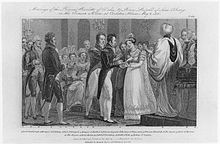
On November 5th, 1817 Charlotte gave birth to a stillborn boy, and though the Royal Family who had gathered were told that Charlotte was doing well, after midnight she began vomiting and complaining of stomach pains. She was soon dead.
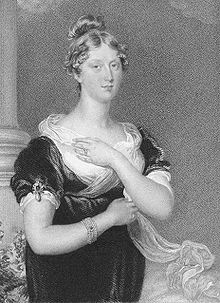
DWW-Though a short life, and one where she had the chance to be as her cousin Victoria later became, a figure in English History, she had a life filled with unhappiness, the drama of her parents, and happiness. Her own bliss in marriage and then the pursuit of marriage. The suitors and the way she played them, knowing that she had more cards then her father since she would be a Queen.
If she had survived to go on and become queen with a young family, the Regency Age, I think would have continued and though Charlotte would have been the first English Queen with such a name, I do not think we would have had an era known as the Charlottian Period. The last picture we have of her, the gown, her hair done so, suggests to me that we would have seen society and culture mush different than what came with Victoria, and her era so tainted by the death of Albert later on.


October 19, 2012
A Regency Era Peronality–William IV
The preliminary work on the Timelines of the Regency Era has now been presented. 50 years of happenings, events, births and deaths of prominent figures. It is not over. There are probably a good thousand more events to be recorded. In fact, at this point only those details through 1802 have been added into the Timeline.
The rest takes a great deal of editing, as well as searching and placing the graphics. The first years of 1787 to 1801 can all be found at Regency Assembly Press’ Timeline page
There are a lot of pictures shown there. It will add to your visualization of the Regency. But now, what to include in my daily posts. For months now we have had something new every day, and by the number of hits we are not getting, there is a small following.
Soon we will have an Edwardian Timeline, but for now, Regency Personalities is something I have thought to start on.
Today, the next king of our period, William IV. Much of this is work I did for the English Historical Fiction Authors, of which I am a member of.
William IV ‘Sailor King’
Reigned 1830-1837
August 21st 1765 to June 20th 1837
William, George III’s third son, served in the Royal Navy in his youth and was nicknamed the “Sailor King”. He served in North America and the Carribean, but saw little actual fighting. Since his two older brothers died (George IV and Frederick, Duke of York) without leaving legitimate issue, he came to the throne when he was 64 years old.
There is a dichotomy about William for he has arcs in his life in regard to women and his actions during the Regency. When younger, he was a bounder the way we portray them now in our Regency Romances. Then he moves into his devoted phase with Dorothea Jordan. Twenty years (1791-1811) and ten children in domestic bliss at Bushy House.
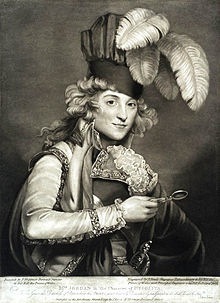
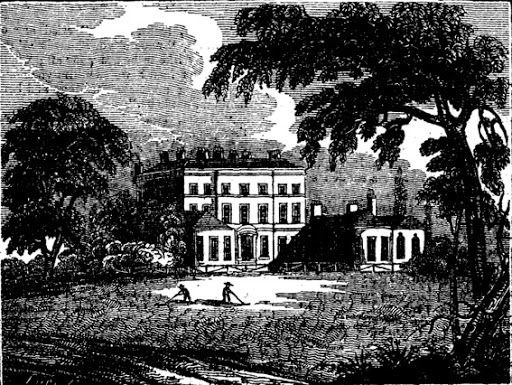
The last of the arcs I think that can be attributed to William is his devotion to the succession. Adelaide gave him three attempts, one girl living only one day (Princess Charlotte), the other, 12 weeks (Princess Elizabeth.) A sad tale. But William remained devoted to Adelaide for the twenty years they were together until his death.
With his marriage to Adelaide he was transformed. He worked to become healthy and Adelaide took care of his finances turning their household from being in debt, to having money in the bank.
During the period before he became king, he was Lord High Admiral and as such he ended the use of the Cat o’ Nine Tails for most offenses. He improved the fleets gunnery. And got the fleet to be better prepared for action. He commissioned the first steam warship. After this period he served in the House of Lords.
Of his illegitimate issue with Dorothea Jordan (Bland) his eldest son was made Earl of Munster, and thus these descendants are firmly a part of the Nobility.
His reign saw several reforms: child labour addressed, the poor laws were updated, slavery was abolished in nearly all the Empire, and the electoral process reconfigured in the Reform Act of 1832. Though William did not engage in politics as much as his brother or his father, he was the last monarch to appoint a Prime Minister contrary to the will of Parliament.
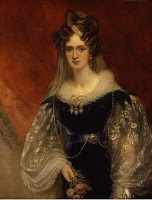
* *
William had a few short words for Lord Grey, the Whig prime minister, when the reform of Parliament was under consideration. Lord Grey requested the king to dissolve parliament, as a preliminary to a general election and victory for Reform. For the only time in his life the agitated king responded with verse:
‘I consider Dissoultion
Tantamount to Revolution.’
* *
The need for an heir was so important, that Adelaide who was barren was made scandalous.
‘Jonathan Peel told me yesterday morning that L[ady] A[lice] Kennedy had sent word to his wife that the Queen is with child; if it be true, and a queer thing if it is, it will hardly come of anything at her age, and with her health; but what a difference it would make!’
this from The Greville Memoirs
Just a few anecdotes from these men and women who were the rulers of our Regency. It shows that they were capable of great things, even though they still were people.
* *
When William was forced to give up Mrs. Jordan, for he had to try and get a legitimate child for the succession, he made one request after they separated. That she not perform for money and thus embarrass his stature, for it did seem likely he might succeed his father, but surely a legitimate child would.
Mrs. Jordan though had other children who had incurred debts, that were not FitzClarence children, those born of William. And Mrs. Jordan felt obligated to help them, so she did perform. And she was then cut off. Rumors circulated that William demanded repayment (probably false rumors–DWW.)
From Windsor in ‘My Hanoverian Ancestors’ we have: Enough wit was left her, however, to signify her refusal by sending him a playbill with this notice: ‘Positively no money refunded after the curtain has risen.’
* *
That when younger he took full advantage of being a Prince of England, and apparently quite popular and what we might attribute as coarse, but was probably expected behavior and more that of a rake and cad when we look back two hundred years later. In Hanover (which he would be king of as well) he found that the ladies there were not near as enticing as the ladies of Westminster and England. He wrote a letter of his exploits. How he was forced to perform (have sex)
“with a lady of the town against a wall or in the middle of the parade…”
Being a sailor with a woman in every port it would seem. (It is easy to think that the spares, for William was a spare at this time, can lead a life different than most, and yet there are many men who have such chutzpah in regards to their pursuit of sex and treatment of women.)


October 18, 2012
A Regency Era Personality–Lady Hester Stanhope
The preliminary work on the Timelines of the Regency Era has now been presented. 50 years of happenings, events, births and deaths of prominent figures. It is not over. There are probably a good thousand more events to be recorded. In fact, at this point only those details through 1802 have been added into the Timeline.
The rest takes a great deal of editing, as well as searching and placing the graphics. The first years of 1787 to 1801 can all be found at Regency Assembly Press’ Timeline page
There are a lot of pictures shown there. It will add to your visualization of the Regency. But now, what to include in my daily posts. For months now we have had something new every day, and by the number of hits we are not getting, there is a small following.
Soon we will have an Edwardian Timeline, but for now, Regency Personalities is something I have thought to start on.
Today, the next personality of our period, Lady Hester Stanhope (She had such great quotes about George IV and Caroline).
Lady Hester Lucy Stanhope
March 12 1776 to June 23 1839
Her prominence is from 1803 to 1806 when she served as Hostess for her uncle, William Pitt the Younger
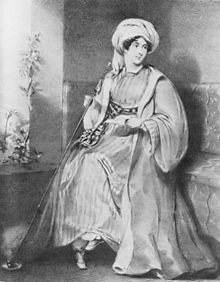
She was the eldest child of the 3rd Earl of Stanhope, whose wife was sister to William Pitt the Younger, and in 1800 went to live with her grandmother, the Countess of Chatham, widow of the William Pitt the elder. So Lady Hester could be counted to have lived in the households of the highest political circles. Her grandmother, the countess, Hester Pitt, who our Lady Hester was obviously named after died in 1803 at the age of 82. Our Hester was then 27 and still unmarried. She was on the shelf in our regency terminology.
At this time, Pitt the Younger was Prime Minister and also unmarried. (Nothing scandalous here I believe though Lady Hester was accounted a great beauty) The Prime Minister needed a hostess and his niece had just finished doing duty to his mother. She did this task with great success and when Pitt was out of office, she served as his private secretary.
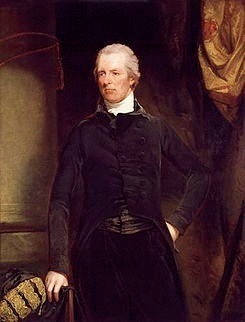
She was the initiator of the gardens at Walmer Castle while Pitt was Lord Ward of the Cinque Ports.
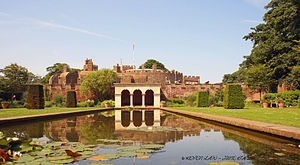
Upon his death the government awarded her £1200 a year. She first lived in Montagu Squar in London, then moved to Wales but left England for the second act of her life in 1810.
It is claimed that when she and her party (which included a man who became her lover) arrived in Athens, Lord Byron dived into the sea to greet her. En route to Cairo her ship encountered a storm and was shipwrecked on Rhodes. (Again, another classic heroic tale) All possessions gone, the party had to borrow Turkish clothes. Here Lady Hester wore male garb. And this was how she met the Pasha. (Again, classic heroine stuff here.) For the next two years she visited Gibraltar, Malta, the Ionian Islands, the Peloponnese, Athens, Constantinople, Rhodes, Egypt, Palestine, Lebanon and Syria.
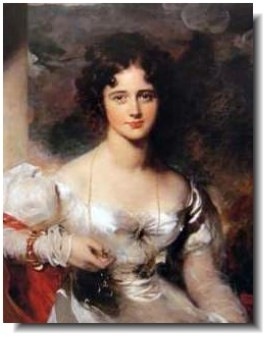
Her entourage to visit Palmyra was so large (22 camels just for her luggage) she was greeted as Queen Hester.
In 1815, she was now a fixture of the middle east. A document came into her possession that said a great treasure was hidden in the ruins of the mosque in Ashkelon. She journeyed there, and the governor of Jaffa was ordered to accompany her. They did not find the three million gold coins she thought she would find. But they did find a seven foot headless marble statue. She ordered it to be smashed into a thousand pieces and thrown into the sea. Aside from the horrific destruction, this was considered the first modern archealogical excavation of the Holy Lands.
One should note that Lady Hester began her travels and continued them while the Napoleonic Wars were taking place.
Now the last act of her life was her settling permanently in the Middle East. She settled in Sidon, in now Lebanon. These last years she provided sanctuary to the Druze and the local emir, Bashir Shihab II who at first greeted her with courtesy turned against her. However she had such power that she had near absolute authority over the surrounding districts. Truly, ‘Queen Hester.’ Ibrahim Pasha had to consult with her when he was about to invade Syria in 1832.
This did change. She accumulated debt, and when the money ran out, she became a recluse. Her servants began to take off with her possessions when she could not pay them any longer. She would not receive visitors in the end until it was dark, and then they would only see her hands and face. She wore a turban over her shaven head.
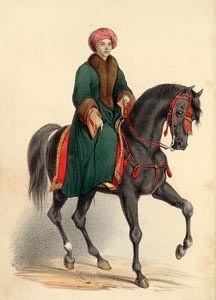


October 17, 2012
Ruritanian Romance: Serializing a chapter at a time Chapter 7
‘The Prize is Not as Great as You Think
As I have been plugging for the last few weeks, I now present you with the serialization on Wednesday’s of The Prize is Not As Great As You Think. That has been my working title and it is possible that before all is done, something different will suggest itself. Something shorter.
As mentioned it is a Ruritanian Romance. I can’t remember just now how the idea came to me, but then after it did I started to research, and reread such works as Edgar Rice Burroughs 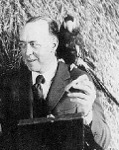 the, The Mad King
the, The Mad King  as well as the The Prisoner of Zenda
as well as the The Prisoner of Zenda  to prep for writing my tale.
to prep for writing my tale.
To prep you, the tale deals with events in the Grand Duchy of Almondy, as I describe ‘bordered the north of Switzerland. To the east was France and now Belgium. The Germanies to the west, and finally the Netherlands to its north. Almondy was landlocked.’
One of the characteristics of a good Ruritanian Romance is intrigue. And as you can tell from the position of the country, the buffer between Germany and France, there certainly will be opportunity for it. With such neighbors, and set 836 years after the conquest. The conquest that took place the same year the William invaded England and defeated Harold. The year of our story begins in 1902, September.
A period of time when the Great War is brewing.
I hope you enjoy and should you like to leave feedback before next Wednesday and the next installment, please do so.
Chapter One can be found either at our website
Or here on the blog
Chapter Two
Chapter Three
Chapter Four
Chapter Five
Chapter Six
It is the after the assassination of Crown Prince Reginald and the new Crown Prince, our hero Gerald must take control of the situation. He has had a night’s rest, or what can be thought of a night seeing as he retired so late. He has many people to meet and much to decide since the Grand Prince is incapacitated by his grief. One of the first orders of business is enlisting the aid of one to help him write his speeches, which he is first has to be given while his dead cousin lies in state at the main cathedral during Evensong later that day. Prince Gerald meets Lady Catherine Keller for the first time.
Please join us on Facebook should you choose to
Dramatis Personae (so far)
People
Athelstan Perry-Bastard son of the Grand Prince of Almondy
Crown Prince Reginald Baxter Simeon Fitzroy Perry-Heir of throne of Almondy
Grand Prince Michael Alan Henry Fitzroy Perry-Ruler of Almondy
Michael VII-Grand Prince around 1640’s
Gerald Henry William Fitzroy Perry-2nd in line to Grand Prince
Princess Margaritte-sister of Baron William
Baron William Fitzroy Perry-Leader of government
Prince Michael Fitzroy Perry the Castle Snatch, Founder of the Fitzroy Perry, and conqueror in 1066 of the Almondian Keep.
Samuel-Bodyguard of Crown Prince Reginald
Franc-Bodyguard of Crown Prince Reginald
The Citizens of Splatz
Pieter-Baker
Henry Samuelson-Carter
Father Guiseppe
Doctor Coyne
Chief Constable Lestaing
Master Helmut-a Farmer and neighbor of Prince Gerald’s
Farmer Friedrich
Mr. Mueller
Master and Mistress Bette Kramer-onwers of the Blue Belle
Hilda-maid at the Blue Belle
Mr. Granowitz–the Bookseller
Mayor Goretz–previous mayor of Splatz
Captain Sir David Lieven-Captain in First Cavalry Regiment
Captain Adolphus Krabbe
Sergeant Phillipe
William Glau
Henry Levi
Francois Diedrou
Lady Catherine Keller-Daughter of the Minister of Justice
Captain Dain-an Aide to Crown Prince Gerald
Places
Celebont Palace-The permier castle of the Grand Prince of Almondy
SunDawn Palace-Home of the Crown Prince of Almondy, on St. Alban’s Square
Ritzlauer Hotel-Where Athelstan Perry lives
Steilenberg-Capital
Almondy-Our mythical Country, north of Switzerland
Castle Repos where Reginald is headed to spend a few weeks before he is killed
South Street
The High Street
St. Alban’s Square
The Cathedral of St. Alban
Splatz–Small village where Prince Gerald has his farm on the outskirts of
Nantz–nearest town to Splatz and Castle Grayton where there is a railroad stop
Castle Grayton–Hunting Lodge near Splatz of Prince Reginalds
Glemaire–Village between Splatz and Nantz
7) This Can Not be Our Crown Prince
Catherine stood with some others waiting to be admitted to see the new Crown Prince. Her father, Lord Keller, had asked her if she would help the new Crown Prince with writing his speeches. Today, because of what happened the previous day, she had her one black gown on. Thankfully it was easily modified and she had spent the previous day doing so.
Knowing that Prince Michael Alan was not doing well, she had been thinking of purchasing a formal mourning gown. Her parents of course had such clothes. But the murder of the Crown Prince had been a surprise, despite the earlier attempts on his life, and Catherine had not found anything she could wear and fit into in her closets but the one gown.
It was tasteful, and she had spent the better part of the afternoon the day before turning the wing collar that had been of red, into one of all black that encircled her neck. She did not think anyone could see that she was an imperfect seamstress unless they took a very close look at her handiwork. Fortunately, aside from the collar and cuffs of red, the rest of piece had been dark. The cuffs, when torn away had revealed black linings, and a satin band at each easily gave the lie that the piece was intended for mourning at the outset.
Catherine thought the Prince was smart to realize that he needed to perfect what he said when he spoke in public. That did make such a difference. She was of the opinion that more of the men in the Assembly needed to study how to speak well. One lord, an FP, or Fitzroy Perry family member as many called them, often got up and spluttered and stuttered for some time before he could speak his thought. Being the daughter of the Grand Prince’s Minister of Justice allowed her to watch the proceedings of the Assembly. Not that many of the proceedings had an impact of the currently ruling FP, Grand Prince Michael Alan.
Her father had come home that morning after midnight but Catherine had not yet gone to sleep. Her younger brothers were still awake as well as her mother, and all the servants. It was not rare that her father was summoned to the palace for the Grand Prince had need throughout the year to do so. The death of Crown Prince Reginald had made the day different then any other times. Two years before the King of Italy had been assassinated. Catherine remembered that. Then twenty years before, her father said, the Tsar of Russia had been murdered. Even the Empress of Austria had been attacked, so it was not just the leaders, but their wives too that were vulnerable.
It was a pathetic excuse of a man that attacked the wife of one of the rulers of the kingdoms of Europe. Catherine and the Keller household understood some of what was to be done to end the insanity. Catherine knew that the other attempts to kill Reginald had resulted in meetings at the Celebont Palace. Even one that her father had called an emergency. This though was definitely a meeting to handle a national crisis. Not that the Minister of Justice could contribute much, he told them when he returned home.
Lord Keller described how competent the new Crown Prince seemed. A quiet man who had come up seldom from the country to attend the ceremonies he had to as an FP. There were so many Fitzroy Perrys everywhere that you had to watch what you said in public on ocassion. Even mother said she had some of the FP blood but not that you would notice. One sixteenth she said and no reason to bring it up. Not even for the boys sake. Though on that, her father disagreed. They would each have to go to the army and train as officers for two years. Then if they wished to do something else, and Lord Keller hoped that they both would read law, they could.
Her brothers were voracious readers. As was she.
Catherine had not had to go to the army, and she knew from the age of fourteen that she wanted to study law. So she did, though she would never be allowed to practice it, for women were not recognized in such professions. She did excel at it and even helped her father in his duties as the Minister of Justice. Eight years she had studied law and had helped to write several of the rulings that the Grand Prince needed to deliver about the law.
A mix of English Law, the Code Napoleon and even Halakhah, the Rabbinic Jewish law made up the laws of Almondy. Lord Keller was beside himself though, when he returned home.
“I fear the young man has a great deal of work ahead of him, but then I supposed I thought the same of Reginald and did not know if he would be up to the task. These last two years we thought that our own anarchists of Almondy were behind these attempts, but the young Crown Prince mentioned that he thought the Germans or French could just as easily be behind the actions.
“I have been a fool, and the other ministers not seeing it. Lord Hermes has some of the spies report to him and if he has thought this he has never said such before to me, or talked of it to Prince Michael Alan either I surmise. If the other nations would result to such murder, and now I think they very well could, we are in for dire times. Prince Gerald is right that peace, which we want, may have been wrenched from our grasp and no matter how hard we cry for it, the war that comes will rend us apart. That, Reginald would never have been able to govern us through.”
“Father, do not say so. Prince Reginald would have found a way.” Catherine did not think that Reginald was some hero. But he was gone now, and she was not sure that it was as bleak as her father said.
He nodded, “You are right. I should not speak so of the dead. I must tell you though, Catherine, you have been requested to be at the Palace promptly at seven. The council all thought you would be the best help for his highness. He feels he must speak publicly, and he is right. Prince Gerald wants to have speeches prepared and seeks help, for he says he is just a farmer. I think he is much more than that and Steilenberg will never be the same. Can you go tomorrow early and help him? If you do not want to, I shall send your regrets. I know he will understand.”
Her mother shook her head, “How does one say no to the Crown Prince? Did you ever think to say no to Reginald?”
Lord Keller smiled. “I did think so, and several times I had to. Sometimes what he did was outside the law so to speak. Other men we would have jailed for such actions but his father makes the law and the Crown Prince is presumed to have such powers if needed. However when asked for advice or told what he wanted to do, I did tell Reginald no. More than once. But this is a new Crown Prince. One I do not think is as wild.”
“That was not what I meant, husband. If you are asked to be of service to the crown, you have always said you are to say yes. When asked to be of service, you serve. This is how you have taught our children.” Mother had not looked happy, Catherine reflected. She surely feared that Gerald would be like his cousin Reginald. Part of the papers that her father avoided were the pages that were devoted to what the notables of the Principality did. The gossip section, her mother called it.
Her mother read that section daily and usually it had been filled with the exploits of Reginald and various aristocratic women, or women of lessor society who thought assignations with Reginald would see to their rise in the highest circles. Which it did. Some weeks later, women who had been reported as having been seen with Reginald or had slept with him, often found themselves awarded to orders of Almondy’s aristocracy. He was indiscriminate in his attentions and his gifting to the ladies he favored. It was also a prerogative of the Crown and one that the Crown Prince nearly diminished in his abuse of it.
Now Catherine stood with several men, only one she recognized, waiting for the Crown Prince to finish his breakfast. The man who stood out, William Glau, was famous in those gossip papers her mother read. He never had as many entries as Reginald had, he did however escort some of the very same women. Catherine had never had the pleasure of Glau’s favor. Nor that of Reginald, thankfully, though she had met Reginald several times here at the Celebont Palace. Catherine believed herself smart enough not to attend Reginald at his Sundawn Palace, and wisely had found excuses on the two occasions the Prince’s royal notice thought to bestow itself on her with an invitation to be escorted by him to a society event. After which would have culminated at the Sundawn Palace and one of its bedrooms.
Athelstan then appeared as the clock struck a quarter past seven, “What, are you gentlemen still waiting? Well his highness is running late I am sure.” Athelstan looked like he would advance to the doors and open them.
There was a man dressed in the uniform of a cavalry captain. “If it would please you, Lord Athelstan, cousin, his Royal highness Gerald is still breakfasting and has left orders not to be disturbed.”
Athelstan laughed, “Cousin Lieven, you know I am no lord, and Reginald often said the same which never stopped me before.”
Athelstan continued to move to the door, but there were four guardsmen, in what were very strange guard uniforms standing there. A sergeant also stood there. His sword drawn.
Athelstan was not a lord, Catherine knew. A man who was unique and she was sure he preferred that reputation. The white to the black that had been Reginald. He advanced the last steps to the doors of the room they had all waited in front of and two of the guards brought their rifles up and aimed them at Athelstan. “Far enough my lord,” the sergeant said. “His highness is quite serious about being interrupted. I would hate to have to kill you. The Grand Prince having lost one son yesterday. Losing his other son today would be crushing.”
Athelstan stopped cold. “This is not funny sergeant.”
“Not laughing my lord. But his highness gave us instructions and he speaks with the Grand Prince’s voice now. I had that direct from my predecessor who heard the Grand Prince and saw the proclamation. Seems he said you knew something of it as well, if my memory is right.”
“Yes, yes, last night. I am sure my father is overcome with the grief at my brother’s murder. Will you now tell Prince Gerald that I, and these others await?” Athelstan gestured to them all.
“Seems he knows about the other, for one of the footmen inside the dining hall put his head out a few minutes ago to say things were running late. We had a man run for coffees for the lords and lady here. Perhaps you can ask one of the footmen to fetch you one as well. But no one knocks on the door to interrupt the prince except the Grand Prince himself, and I know that your father is not yet awake, my lord.” The sergeant seemed to enjoy the task he had. Catherine had to admit it was a little comical.
Athelstan grunted in exasperation and then turned to the cavalry captain, “Sir David, do you know what this is about?”
“No. Prince Gerald has a meeting.” Catherine then placed the man’s name as Sir David Lieven and remembered she had a branch of cousins named Lieven. Perhaps she had met them, for once every few years all the distant cousins were invited to the Celebont Palace for one reason or another. FPs were invited much more often.
“This lord annoyance. What of that?” Athelstan asked.
“Oh that I can tell you. Though you should wait till Prince Gerald does.” It was clear Athelstan was too impatient to wait. “He thinks you have long been dishonored, for the last royal bastard was acknowledged as a lord. Our entire family line was founded by a bastard, as are our English cousins. There should be no shame, and you should be honored he feels. He intends to show you such respect, ask your father to show you such respect and have the principality give you it.”
Catherine turned her mind from what the two talked of, for Athelstan clearly did not want any such recognition. He must have become hardened to not being treated kindly by his father in that regard and begun to wear that treatment like a coat to keep others away. Catherine looked about the hall. William Glau, Sir David Lieven, she wondered who the others were and why Prince Gerald required them here.
Two footmen approached with the coffees on a tray. She had learned that in many places in the palace, the kitchen staff had taken to converting rooms, or closets where they could, into places that such light refreshment could be prepared so that it would not be cold when asked for by those who needed it. Having been at the Palace many times, she knew that the main kitchen, for there were two others beside the main one, was quite a walk from the largest hall that was used for banquets. The hottest food prepared there would be only warm without devices to reheat them before being served to the royals and their guests.
“Your coffee my lady,” a footman said. She thanked him. She was a lady for she was the daughter of a lord. Her father a baron. But not a great landholder. His lands in the north of the country and on the German side. He would have been awarded the same title by courtesy as well when he had become the Prince’s Minister. Men without land or title but who had proven skills so valuable as to advise the Gand Prince and lead a ministry for him were given such titles. A mark of respect.
That, Catherine believed, was the best use of title, to mark respect. And the best way one who had a title should use it. To live up to the respect that went with it. That was how she was raised and how her father acted. That colored her own views, she knew. That, and how she read and interpreted the law. Thankfully, most of the Grand Princes had known well to make the law stronger than privilege. Far too many of the aristocrats thought that the law did not apply to them. The truth was that very few laws did not apply to the aristocrats, though the Grand Prince and his family could do virtually anything they desired.
She wondered how that applied to Prince Gerald for he was a cousin of the Grand Prince, but he was not the son of the Grand Prince. The law was built upon the Crown Prince being the son of the Grand Prince if he were to bend law or tradition. Gerald also did have a proclamation imbuing him with the powers of the Crown Prince until his investiture which was custom and necessary to cover the period until that day. It gave him all the powers as if he had sat through the ancient ceremony.
Why have the ceremony if the proclamation existed, her legal mind asked. For the ceremony only was that. A chance for all the principalities notables to gather and be seen by the populace. A chance for pomp. She could watch from outside St. Albans, but her parents would have to dress up, her father wearing his robes of state, and attend inside the cathedral. The ministers sat opposite the Dukes and Counts and their wives.
Though they would probably be all gathered a few days before in more conservative and somber clothes for the funeral of Prince Reginald. Her father had said it would be the following Wednesday and he said that he wished all his family to attend the lying in state, preferably sometime today. She had seen some people already at St. Albans forming a line, and a few constables there readying barricades to facilitate a line. More than three hundred thousand lived in Steilenberg, and with those close enough to travel to the city and back to their towns and villages in a day by simple means, well over a million. The city would be packed the entire week and then the following Wednesday, it was going to be a nightmare.
The door to the room where the Prince breakfasted opened and two footmen came out with carts of food. They hurried by and then another man came out striding quickly and carrying several portfolios. There was a call from inside and the guard at the doors then snapped to attention and opened the doors fully, “You may all go in, the Prince is ready for you.”
The men, and Athelstan especially, made their way forward, but Catherine turned to look at the servants who had left. She saw one give his tray to another of the servants who had been in the hall, and then he hurried after the man with the portfolios. That made little sense to her.
She entered and tried to place the Prince in front of her, now standing with a tea cup in his hand, wearing an army uniform, with three ribbons. One would be a service ribbon for all got that when they were in the army, but three ribbons were few for a Prince. It was also low in rank. The bars of a lieutenant? He was the commander of countless regiments and the most powerful man in the army aside from the Grand Prince. Why wear that? And why were the uniforms of the Guards so strange? Why did they point their rifles at Athelstan? This all was very confusing.
She had seen the man before of course. He was on the front left side these last few years when carrying the platform that the Statue of St. Michael was placed atop. Before that he must have been at the gatherings for family at the palace. He must have been very distantly related to her.
“Good, and Athelstan, I did not expect you this morning. Oh, you must be Lady Keller. Forgive me for being late. I am new to all this and these men, did you introduce yourselves?” He then did make introductions and told her how dreadfully late the men, his friends were up last night and had returned that morning to do him service. He then told all who wished to have a pastry and enjoy more coffee or tea. He proclaimed it excellent tea and much better then he had been making for himself the last few years. His friends laughed at that.
“Your father tells me you also know a great deal of the law. These friends and Athelstan are my conscience. I know that we need to make changes in many things, and Athelstan here has told me these last few years how much of a powder keg things have become in Almondy. That Reginald was killed because of it. So changes we make, plans we start, and we do what we can to prepare. If you will help me write the words to all our people that I must see and speak to so we can restore calm to Almondy. Help us find a way to get peace here, and abroad, your principality will be grateful. And if you think we overstep the law, please tell us.”
He smiled then and it reached his eyes. She saw a man who was tall, at least two inches above six feet, perhaps three. The Fitzroy Perrys had been working towards such height for generations. Michael, the Castle Snatch, was regarded tall at five feet nine. Though that figure was not written down, his suit of armor had been preserved in the royal armory and then transferred to the new museum, opposite the Sundawn Palace. Catherine had seen it and the curators had made a big production that several hundred years ago, the first Prince was taller than many others of the time.
Gerald seemed lean to her, though broad in the shoulders. Much more so than the cousin who stood near, Sir David. She could look to each in uniform and see that Gerald’s shoulders were broader than his torso, while Sir David’s shoulder were the same width as his hips. Catherine made to laugh at herself for she had begun to look at men that way recently.
Sir Pascal Renard had begun to pay attention to her. The son of an industrialist, much like William Glau, though not in munitions, he was rich and well connected. Only a third generation Almondian, but owned two clothing factories and he was making a good deal of money from them. He had asked her to various social activities and that she had agreed to go to three so far with him was a novelty for her. She had never gone on three dates with any man.
Most men she met she had not cared what they looked like. For instance she could see that the Prince had sandy brown hair which made his face light and his blue eyes even made it lighter. A strong chin caused her attention to center at his mouth and eyes, and his nose did not get in the way when he spoke. He also was clean shaven, which was not usual for much of the nobility of Almondy. Sir David standing near him had a mustache, groomed and sitting atop his lip as if it had decided that a simple blanket needed to be applied to that spot.
“You have to forgive our cousin,” Sir David said. “Usually he is much more aware of the social amenities and would ask after your mother and brothers, though he may have forgotten that you have two younger brothers.”
Gerald laughed, “Yes, I am sorry I hope that they are in good health, and I promise to be attentive to such at a later date. I have a meeting with the Assembly leadership though this morning, then the Ecumenical Council of Almondy, and still no word on plans for cousin Reginald but that he lays in state at St. Albans. I must go and will try to be there at noon, as well at Evensong this night. I do not know if Prince Michael Alan shall accompany me. I have much to do and keep forgetting what is the most important thing I should be doing. I hope though you can aid us. Krabe here,” He pointed to another man in uniform who had entered, motioning to two behind him to stay back, “is my aide de camp at the moment and has an agenda for the day. It has been revised since I arose, twice. He and I could use as much help as we can find. I suppose cousin Athelstan you are laughing at this. I know you are grieving for Reginald as does the Principality, but laughing as I see you do, because I am overwhelmed by all this, is not supportive.”
Athelstan was laughing, and the other men seemed to see the humor as well. Even the man Krabe who had entered, also in a cavalry uniform like Sir David, laughed and then quickly made himself devoid of expression.
They all did laugh then and the Prince seemed to laugh as much as any. She had not known Sir Pascal to laugh at any of his own predicaments and he had been involved in some when they were together. “Yes highness, I will help as best I may. I am sure that anyone you asked to help at this time would be honored to aid you.”
Here he became serious and stepped over to her, taking her arm firmly. “Excuse me for a moment gentlemen,” Prince Gerald guided her to a mirror which turned out to be a door. “Apparently the Palace is riddled with such doors. This leads to a hallway but there is a door on the other side of the hallway to another room. Quite a good view actually, will you join me.” He had not let go of her arm and actually had guided her.
“Yes of course.” She was not going to refuse the Crown Prince anything. Not at all.
As he had said a thin hallway, but then if it were a secret hallway, they were probably all thin. Across was another door and here was a room with a balcony. “You will see when we are returned to the other room that if you leave by the door at the end of the room, there is a hallway that brings you to this room as well. But I thought to share a secret with you, though perhaps your father has shared this already with you.”
“No highness. Not this.”
He nodded, “Well those men in the other room, most, I have known for years and I am going to share with them at various times my true thoughts. I am going to look for ways to maintain the peace. Here amongst ourselves if we are really threatened by anarchists, or between us and the other countries of Europe, I need the best and brightest to help me not because they feel that they must. If that is what brought you here, please go home. Really, I will ask odd things at odd hours and I assure you, your life will be rather chaotic. You must know that I have done my best to escape Steilenberg these five years and now have been drawn back in.”
She saw that he was in earnest and his eyes, when they looked at her, betrayed his terror. His need for help. “Highness, that is so much to think about it…”
“Please, my lady. Cousin, call me Gerry when we are alone. I shall have hundreds each day call me highness or sire all the time. I need those who can, be able to remind me that I am still only a man.” The Prince seemed very sincere.
She looked at him, “You are very frank. I think you need to hide that for it will be used against you.”
He motioned for her to sit, and then he took a seat as well. “I am not sure I want to get rid of that. If in negotiations with the German and French ambassadors, perhaps, but not when speaking to our people. They feel distanced from our ruling family. Trust me, for I was in a small village and can tell you that it takes time for them to regard we Fitzroy Perry’s with anything like trust.”
“Not just the people in the country highness. Gerry.” She smiled remembering he wanted to be addressed familiarly.
“Yes, most of those living in Steilenberg have family in the country. We are not so sophisticated in the capital as we purport. One day we will be, and we will raise all of Almondy to that level, all those who want to aspire to this modern world. Then we will rank as one of the great powers. That at least is the dream. Now please, can you be frank? Think for a moment before you answer and think about what you wish to do and have wanted to do these last few months. I fear that if you agree to help, I shall be asking for your aid a great deal. Though I may not ask as much as my friends who will find their sleep interrupted. Not that I intend to be malicious with my friends and abuse their volunteering of their help, but I fear that the nature of our country and its needs at this time will do so.”
She sat back into her chair and let that digest. “When I said you were frank, I now need to find a word that expresses that even more. You think about that more than I had even suspected. You may see further than anyone else I have talked to about our country. Father certainly has reservations about the future, but what you ask, you do know that I am a woman?”
He laughed then. A great deal. Then looked like he would stop and laughed again. Finally he got it controlled. “My dear, I can see that. You are a woman men take notice of, but you must know that. Were you wearing more provocative clothes I suspect Sir David and William would have done their best to stop you from leaving the mirror room. Did you not notice that their eyes were on you near the whole time we were in the other room?”
Catherine knew she looked good, for she was five feet nine inches and thus tall for a lady. Her strawberry blonde hair came down to the bottom of her shoulder blades when unbound and she stood straight with very little extra weight upon her frame. Catherine was thin except where she should bulge, in her backside and her chest. A chest that her last dressmaker had wanted to show off as a statement to fashion, and then was told to rework the dress twice so her bosom would not be so obvious.
Catherine had found that if men could see any part of her breasts revealed in her dresses, they did not notice her face. And she was proud for her teeth were straight, her eyes a light shade of green, and her skin unblemished. Sir Pascal, rich enough that he could see any woman of society, at least whom Reginald had not been courting, or someone richer like William Glau escorted, proclaimed her a beauty. It seemed that so too did Prince Gerald.
“That is not what I meant…” She was not upset by his laughing, well she was a little. She did understand the stress he must have been under. She and her father had talked of it as he escorted her to the palace that morning in his carriage, then he went onto the Ministry of Justice. It was on North Street about 300 yards from the Palace gates. Most of the ministries were close to the Palace. Except for Ministry of the Military. That was near Castle Abwehr, though why it was not in the castle was a mystery to her. It seemed to Catherine that the Ministry of the Military should be in a castle.
Prince Gerald touched her hand, “I know. In a land where very few women do anything more than act as housewives, or work alongside their husbands or fathers in a shop as a clerk, it would seem strange to place a woman in such a position. But the world is changing. We must change also. If the ministers had told me of a man to do this work, of course I would have had a conversation about it with him. I still would look for a woman to come forth and work with me to reform some of our government elsewhere though. As I look for people of all backgrounds. We are not a country that can claim just one background or heritage. Not any longer. Too many Grand Princes have laid the foundation that we would be greater then the sum of our parts because so many parts are different. Is not our law stronger because we have adopted the best of so many influences?”
She said, “Yes, you are right about our laws. But you will make enemies of many men if I am seen helping you with all this.”
“I will be the friend of many woman though if you are seen helping me make the country better. That surely will be more friends than enemies. And though I don’t need more enemies, just being Crown Prince I have inherited enough. Having some new friends should surely help. At present we have a small, very small suffragette movement. Since men do not have the vote universally we can’t be accused of drastically discriminating against women. But it would be nice to move forward on all fronts.”
She nodded, “Then yes, yes I shall help and I am not afraid of all the work that you say you will throw at me.”
“Good. Come we best get back else William, or Sir David will think that I have stolen the chance that they have to make a good impression upon you.”
He stood then lent her his hand to help her to her feet. “I do not know that I desire any man to make a good impression on me this week. With the death of Crown Prince Reginald, perhaps such frivolity is misplaced,” Catherine said.
“You are assuredly correct. Come we shall go the long way round and enter by a real door. That should cause them some consternation. I think that will sharpen their senses and it is what I will need help with these next few days.”
When they entered the mirror room the other men were shocked though Athelstan seemed at ease. He had lived in the palace so he must have known of secret doors and passages. The men had been drinking coffee and she and the Crown Prince had not been gone too much longer than five minutes. “All taken care of?” Athelstan asked. He had taken a seat at one end of the long table, which left the other to the Crown Prince.
Gerald said, “Henry, can I trouble you to move to the head of the table? I have found that if you sit in the middle of a table such as this oval, you can hear all the better for the furthest end you will be hard pressed to hear the other end. I am sure should I sit at that end of the table I might miss words of wisdom of cousin Athelstan. Now Major Krabe, you have another officer to help us with our task?” Captain Dain was introduced and took a place, the Prince rearranging the table so that his aides sat across from him, and that he did not start until they had gotten comfortable. The other officer was an older man who wore a lieutenants uniform of the guards. The first thing that the prince did was sign some papers and explained it was promotions for a few men. He was promoting the man in the Guard’s uniform, and had another being made a captain. The major was also newly promoted.
“David, do you feel you are in line for a promotion? Should I ask the generals?” Prince Gerald asked.
“Those you can trust,” Sir David said back.
“Yes, that will be a challenge. I fear that we have more than a hundred and probably need thirty or less. We have well over a hundred thousand men in the army. That is a lot but perhaps not near enough, or perhaps too much. I know what the generals will say, but today we are not going to talk of military reform. We have just a few things,” and then the Prince went ahead and elaborated on what he thought was the agenda for them all. They talked of the Sundawn Palace, of Gerald’s moving to it. Athelstan said he would go through it but thought he should stay to meet with the Assembly leaders.
Gerald nodded, and asked that Catherine attend as well. Prince Gerald said that he was meeting with just the leaders of each party that was in the Assembly and would address them, perhaps Monday, in their session. It was Thursday and the following day he would still be meeting with the leaders of the country. He would address the people of the nation that night at Evensong at St. Albans. He asked Catherine and Krabe to quickly work on a letter requesting time that evening at the Cathedral. A letter to Archbishop Peter, the prelate of the realm was in order and she quickly made a very humble request and handed it to Major Krabe. He nodded then handed a piece of the Crown Prince’s stationery back to her.
Krabe asked her, “Please your hand is better than mine, would you write that on this and Prince Gerald will sign it,” She nodded and then did so.
They handed the paper to Gerald who was talking about the investigation into the murder of Prince Reginald. “I expect some information from the constables later today. Constable Major Williams has said he will bring a report to the palace each night.”
Athelstan did not know who that was and had to be told, which was news to Catherine as well. An entire group of constables who would look into such crimes, and more than sixty constables already going to work on the murder. He was very much in command and here in the mirror room, he had his own council to help him with his duties.
She knew that Reginald had a friend or two, more like sycophants, who he talked about things that concerned him. Her father, Lord Keller had not said that Prince had Reginald taken notice of anything more then his responsibilities for parades and openings though. The society Prince.
Prince Gerald looked like he wanted to work hard to make improvements to Almondy. That was something that had been long overdue. A prince that wanted the betterment of Almondy would get a lot of support, but also a great deal of opposition. She had long noticed that many were threatened by change. Many would lose by it and so they would resist it.
More would benefit though. If Gerald was genuine. She still did not know if he was. That would come in time. However he had asked that she write a speech and Captain Dain helped to find her a room to do so in. The Prince was already standing and on his way to meet with the lords and leaders of the Assembly. He and Athelstan talking as they walked. “Of course you will be a lord. You have wrapped Prince Michael’s oversight in not making you a lord as if he somehow hates you and you will prove to him that you are deserving. I care that you are hurt by these actions, but the country needs healing and this will be a part of it. Think for a moment for you have many admirers. When you went to the university, the first of royal blood to do so…”
“You went there too,” Athelstan said.
“Yes but for only a few classes, and I was much further from the throne then. Not a Royal Prince. Am I even one now? Not until I sit upon the throne I think…” Their voices became too hard to hear as they turned a corner and Catherine was led the other way. Prince Gerald was right though, even when he was invested as Crown Prince, by law he would not be Royal until he became Grand Prince.


October 16, 2012
A Regency Era Personality–George IV
The preliminary work on the Timelines of the Regency Era has now been presented. 50 years of happenings, events, births and deaths of prominent figures. It is not over. There are probably a good thousand more events to be recorded. In fact, at this point only those details through 1802 have been added into the Timeline.
The rest takes a great deal of editing, as well as searching and placing the graphics. The first years of 1787 to 1801 can all be found at Regency Assembly Press’ Timeline page
There are a lot of pictures shown there. It will add to your visualization of the Regency. But now, what to include in my daily posts. For months now we have had something new every day, and by the number of hits we are not getting, there is a small following.
Soon we will have an Edwardian Timeline, but for now, Regency Personalities is something I have thought to start on.
Today, the next king of our period, George IV. Much of this is work I did for the English Historical Fiction Authors, of which I am a member of.
George IV ‘Prinny’
Reigned in his own right 1820-1830
Reigned as Regent 1811-1820
August 12th 1762 to June 26th 1830
Our Prinny. A short synopsis can’t really do justice. He spent money like water. He married Maria Fitzherbert in a marriage that was illegal, and he knew it. But he loved her. He had John Nash build the Royal Pavillion in Brighton and remodeled Buckingham Palace. He had Sir Jeffry Wyatville rebuild Windsor Castle. He was a patron of new forms of leisure and style and that his friendship with Beau Brummell championed new forms of fashion as well. He was instrumental in the foundation of the National Gallery and King’s College. Ostentatious and an Architectural Marvel.
To get out of debt he married Caroline, and left her promptly after the birth of Charlotte. Caroline was forbidden to attend his coronation. He did try and secure a divorce from her. He had been locked into this marriage and would rather have been maried to his mistress, Maria Fitzherbert. (One should note that marrying Caroline paid off £ 600,000 at the time of his debts. A sum in the billions now.) With his father mad, a Regency was finally established in 1811 and though he was the ruler, Lord Liverpool pretty much ran England and the Empire for him during this time. He was titled ‘the first gentleman of England.’ One would say as his days of Prince that he cut a figure amongst the people, and then as Regent and later King, that earlier love dissipated.
During the war with Napoleon he did not take the effort to act as a leader, but still spent lavishly. He was influenced heavily by his favorites but curiously, where he had championed the Whigs as Prince (he was friends with Charles James Fox), as King, switched his allegiance to the Tories, those who policies were conservative and backed the monarchy.
A revisionist look at this later period sees that Prinny was neither all bad as Regent and King nor all good as the Crown Prince. He was however, a figure much larger than life.
* *
We all think that Prinny spent a great deal on his luxuries. From Christopher Hibbert we have Prinny a compulsive spender.
‘He spent over £ 20 a week on cold cream and almond paste, perfumed almond powder and scented bags, lavender water, rose water, elder flower water, jasmine pomatum and orange pomatum, eau de cologne, eau romaine, Arquebusade, essence of bergamot, vanilla, eau de miel d’Angleterre, milk of roses, huile antique and oil of jasmine. He bought them all in huge quantities–perfumed powder was delivered in amounts of up to £ 33 at a time; toothbrushes came by the three dozen. But then he bought almost everything in huge quantities: in need of a few walking sticks, he bought thirty-two in one day.’
(DWW-remember a man could live in London, by himself with minimal servants on the very edge of the TON, on £100 a year)
* *
He was sometimes what we would think of coarse. From GWE Russell, Collections and Recollections (1898) we have his treatment of Mrs. Vaneck.
At Mrs. Vaneck’s assembly last week, the Prince of Wales, very much to the honor of his polite and elegant Behavior, measured the breadth of Mrs. Vaneck behind with his handkerchief, and shew’d the measurement to most of the Company.
* *
Napoleon and Caroline both perished in 1821. George heard of Napoleon’s death while waiting to hear of Caroline’s. From Lord Holland and Sir William Fraser we have the telling of the story:
‘I have, Sir, to congratulate you: your greatest enemy is dead.’
‘Is she, by God?’
(DWW-I was LOL on this. Caroline should not be treated so, but here we have a class of people who were forced to marry to maintain their class. Recourse to getting out of such disasters were hard, so they lived in a time of difficulty. A time that if we look at the current royals, some of this still lingers. But I think the remark shows some wit on the part of Prinny.)
* *
Of Caroline, George’s wife, but by no means his Queen Consort, we have from Lady Hester Stanhope, Pitt’s niece, and lady who ran his household, after which she emigrated to the Middle East and became a champion of the Druze there, dying a debt ridden recluse in 1839 (and worthy of her own entry as a Regency Personalitiy) and recorded by Henry Colburn from her memoirs:
‘She (Caroline) did not know how to put on her own clothes, … putting on her stockings with the seam before, or one of them wrong side outwards.’


October 15, 2012
A Regency Era Personality–George III
The preliminary work on the Timelines of the Regency Era has now been presented. 50 years of happenings, events, births and deaths of prominent figures. It is not over. There are probably a good thousand more events to be recorded. In fact, at this point only those details through 1802 have been added into the Timeline.
The rest takes a great deal of editing, as well as searching and placing the graphics. The first years of 1787 to 1801 can all be found at Regency Assembly Press’ Timeline page
There are a lot of pictures shown there. It will add to your visualization of the Regency. But now, what to include in my daily posts. For months now we have had something new every day, and by the number of hits we are not getting, there is a small following.
Soon we will have an Edwardian Timeline, but for now, Regency Personalities is something I have thought to start on.
Today, the first king of our period, George III. Much of this is work I did for the English Historical Fiction Authors, of which I am a member of.
George III
George William Frederick
June 4 1738 to January 29 1820
(reigned 1760-1820)
George III was the grandson of George II. He was King of Great Britain and King of Ireland until 1801 When this became the United Kingdom of Great Britain and Ireland. He also became King of Hanover in 1814 (when he was mad-suffering from porphyria which would give the semblance of madness), before that he was Duke and Prince Elector.
The longest lived monarch and the longest reigning king. (Though the last years he was mad and his son was Regent) He came to the throne at the age of 22. He was rather a play boy before settling down with Charlotte. First he was in love with Lady Sarah Lennox, and then Duchess Sophie Caroline Marie. With Charlotte, George had 15 children. Nine sons and six daughters. (George IV and William IV, two sons that succeeded him as King)
In 1762, George purchased Buckingham House, now the site of Buckingham Palace. It was a family retreat. They lodged in Kew, Windsor Castle and used St. James Palace for official functions.
By the time he came to the throne, the royal lands produced little income. He made money for the family through taxation and excise duties. He turned over the Crown Estate in return for an annuity. Half of which he donated to charity.
Extremely well educated and rounded, he was very well prepared to become King. He started his reign on a roll, with victory in the Seven Years War. He is also responsible for losing the American Colonies. Then before his madness took over completely, things were not going well in the wars against Napoleon. France had grown to a giant Empire under his last years of sanity, and only once he was mad did Britain turn the tide and emerge victorious.
Throughout his reign, George was closely allied with Pitt the Younger. And this made Pitt’s political Enemy, Fox become allied with George the IV. One of George III’s first bouts with porphyria may have happened as early as 1765, but another episode in 1788 brought on the first Regency crisis. The bull had passed in the House of Commons, but before the Lords could adopt it, George recovered.
On May 15th, 1800, James Hadfield shot at George in the Drury Lane Theatre. Hadfield failed and George took a nap during the interval. By the time that the last bout of porphyria overtook him and the regency came to place, he was virtually blind from cataracts. When Charlotte died in 1818, he had no idea what had occurred because of his condition.
The family was so large that his fifth son, Ernest Duke of Cumberland said, ‘Nothing in my eyes is so terrible as a family party.’
A closer look at his reign no longer faults him for the loss of America, and now that the disease tied to his madness has been diagnosed and understood, he is not looked at so harshly.
* *
Horace Walpole tells how George III went riding in the fields near Holland House everyday before he finally did wed Charlotte. Even during the time he was infatuated with Lady Sarah. And whilst doing so, a ‘Fair Quaker’ named Hannah Lightfoot was in the field.
‘She appeared every morning at Holland House, in a field close to the great road (where the King passed on horseback) in a fancy habit making hay.
Thackery wrote that she was
‘Making hay at him.’
* *
After the revolutionary war was all done, George said to John Adams as President
‘I wish you, Sir, to believe, that it may be understood in America, that I have done nothing in the late contest but what I thought myself indispensably bound to do by the duty which I owed my people. I will be very frank with you. I was the last to consent to the separation; but the separation having been made, and having become inevitable, I have always said, as I say now, that I would be the first to meet the friendship of the United States as an independent power.’
(DWW-My thoughts. Long winded, perhaps, but this is the true start of our special relationship.)


October 13, 2012
A Regency Era Timeline 1837 in Progress
Timeline
Each time I start a year, I have already compiled a list, months ago with about 6000 entered of what happened from 1788 to 1837. My first step now (It took several trials to get this down to a science) is to cut out the specific year I will work on and paste it into its own spreadsheet to work with. When I worked on the entire spreadsheet, sometimes inserting a line, with all the graphics I had begun to place, took a long time. Working on each year alone, is a lot faster.
With the year separated out, I now turn to my book sources,
The Timetables of History by Grun and Stein

Chronology of CULTURE by Paxton and Fairfield
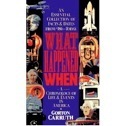 What Happened When by Carruth.
What Happened When by Carruth.
 , History of the World. A beautiful Dorealing Kindersley book.
, History of the World. A beautiful Dorealing Kindersley book.
I now diligently look through each of these to find entries that I did not come across on the internet, and other printed lists. It is possible that there are places that have more listings for each year. I have not found them. And when you go to the Timelines at the Regency Assembly Press page, there you will see all the graphical references as well. Something that I did not find anywhere else.
Here is the start of 1837 thru Victoria. (From what I can see now, after starting the project months ago, it looks like I capped things off at the ascension of Victoria):
Year
Month Day
Event
1837
Jan 2
Mily Alexeyevich Balakirev (d.1910), composer (Tamara), was born in Nizhny-Novgorod, Russia.
1837
Jan 11
John Field (54), Irish pianist, composer (Nocturnes), died.
1837
Jan 11
Francois Gerard (66), French baron, painter, died.
1837
Jan 22
An earthquake in southern Syria killed thousands.
1837
Jan
26, Michigan became the 26th state of the US.
1837
Feb 5
Dwight L. Moody (d.1899), evangelist, was born. He founded the Moody Bible Institute. “No man can resolve himself into Heaven.”
1837
Feb 7
Sir James Augustus Henry Murray, Scottish lexicographer and editor, was born. He created the Oxford Dictionary.
1837
Feb 8
The Senate selected Richard Mentor Johnson as the vice president of the United States. Johnson was nominated for vice president on the Democratic ticket with Martin Van Buren in 1836. When Johnson failed to receive a majority of the popular vote, the election was thrown into the Senate for the first and only time. Johnson won the election in the Senate by a vote of 33 to 16.
1837
Feb 12
Thomas Moran (d.1926), American painter, was born in Bolton, England. His paintings of Yellowstone helped persuade Congress to designate it a national park.
1837
Feb 13
There was a riot in NY over the high price of flour.
1837
Feb 25
Cheyney University was established in Pennsylvania through the bequest of Richard Humphreys, and became the oldest institution of higher learning for African Americans. It was initially named the African Institute. However, the name was changed several weeks later to the Institute for Colored Youth (ICY). In subsequent years, the university was renamed Cheyney Training School for Teachers (July 1914), Cheyney State Teacher’s College (1951), Cheyney State College (1959), and eventually Cheyney Univ. of Pennsylvania (1983).
1837
Mar 1
William Dean Howells (d.1920), US author, critic and editor, was born. He edited the work of William James at the Atlantic Monthly. “We are creatures of the moment; we live from one little space to another; and only one interest at a time fills these.” “If we like a man’s dream, we call him a reformer; if we don’t like his dream, we call him a crank.”
1837
Mar 3
US President Andrew Jackson and Congress recognized the Republic of Texas.
1837
Mar 3
Congress increased Supreme Court membership from 7 to 9.
1837
Mar 4
Martin Van Buren was inaugurated as 8th President.
1837
Mar 4
When Pres. Jackson left office there followed a financial crash and a bitter depression and the government was again forced to borrow money. Pres. Jackson had returned surplus government funds to the state governments as bonuses.
1837
Mar 4
The Illinois state legislature granted a city charter to Chicago.
1837
Mar 4
Weekly Advocate changed its name to the Colored American.
1837
Mar 17
Upon his return to his home in Tennessee, Andrew Jackson, the seventh president of the U.S., proclaimed that he left office “with barely $90 in my pocket.” The old soldier and war hero who had served as president for eight years, spoke those words when he returned to his home in Tennessee.
1837
Mar 18
Stephen Grover Cleveland was born in Caldwell, N.J. He was the 22nd (1885-1889) and 24th (1893-1897) president of the United States, the only President elected for two nonconsecutive terms.
1837
Mar 24
Canada gave blacks the right to vote.
1837
Mar 28
Felix Mendelssohn married Cecile Jeanrenaud.
1837
Mar 31
John Constable (60), English painter, water colors painter, died. His work included some 100 studies of the sky done between 1821-1822. In 2009 Martin Gayford authored “Constable in Love: Love, Landscape, Money and the Making of a Great Painter.”
1837
Apr 3
John Burroughs (d.1921), American author and naturalist, was born. “Time does not become sacred to us until we have lived it, until it has passed over us and taken with it a part of ourselves.”
1837
Apr 5
Algernon Charles Swinburne (d.1909), English poet (Atalanta in Calydon), was born.
1837
Apr 15
Horace Porter (d.1921), Bvt Brig General (Union Army), was born.
1837
Apr 17
J. Pierpont Morgan (d.1913), American financier, was born in Hartford, Conn. J.P. Morgan later owned U.S. Steel and International Harvester. In 1999 Jean Strouse published the biography “Morgan: American Financier.”
1837
May 2
Henry Martyn Roberts, parliamentarian (Robert’s Rules of Order).
1837
May 5
Niccolo Antonio Zingarelli (85), Italian composer, bandmaster, died.
1837
May 9
“Sherrod” burned in Mississippi River below Natchez, Miss., and 175 died.
1837
May 27
Legendary gunfighter James Butler “Wild Bill” Hickok was born in Troy Grove, IL. As a youth, Hickok helped his father operate an Underground Railroad stop for runaway slaves and during the Civil War became a daring Union scout. After the war Hickok’s fame as a skilled marksman, Indian fighter and frontier marshal grew, leading to a stint as a featured attraction with Buffalo Bill Cody’s Wild West Show. On August 2, 1876, Hickok was shot from behind and killed while playing poker in Saloon No. 10 in Deadwood, Dakota Territory. Contrary to his custom, Hickok was sitting with his back to the door.
1837
May 29
Luca Fumagalli, composer, was born.
1837
May 29
Alexander F. de Savornin Lohmann, Dutch minister, party leader (CHU), was born.
1837
May 31
Astor Hotel opened in NYC. It later became the Waldorf-Astoria. John Jacob Astor bought up foreclosed properties during the financial bust. He later sold them for a 10-fold profit.
1837
Jun 17
Vincent Strong, Civil War Union Colonel (killed in action at Gettysburg in 1863), was born.
1837
Jun 20
Queen Victoria (18) ascended the British throne following the death of her uncle, King William IV (b.1765). She ruled for 63 years to 1901.
1837
Morse develops the telegraph and Morse Code.
1837
Great Western–first ocean-going steamship.
1837
The United States officially recognizes Texas as independent. Mexico does not.
1837
Britain invites the U.S. and France to participate in international patrols to interdict slave ships. The U.S. declines to participate.
1837
May) Sam Morse patents the telegraph.
1837
A revolt by the French and some Anglos in Canada fails.
1837
In the Japanese city of Osaka in the wake of the famine, rebellion and fire destroy one-fourth of the city before the rebellion is crushed. At Edo (now Tokyo), a U.S. ship arrives to repatriate shipwrecked Japanese sailors, to establish trade and land missionaries. The ship is fired upon and driven away.


October 12, 2012
Royals of the Regency
Royals of the Regency Post at English Historical Fiction Authors today.
Great post by a great guest blogger. (Okay, it was me 
Another Friday another blog post elsewhere.
People really do need to check out the posts at English Historical Fiction Authors
The EHFA mission statement:
Britain leaves us awed by ancient castles, palaces and museums. History pours out a legacy of battles, a developing monarchy, a structured class system, court-inspired behaviors and fashions, artwork and writings that have created a love for all things British. Some of us feel that we must fuel the fire~ we have come together to share our historical work and to reach out to our much appreciated readers. Please enjoy our posts about the history of England, Scotland, Wales and all the Empire.
I post here regularly. (About once a month) on things Regency. I have posted on Waltzing at Almacks, Regency wall coverings, The Impeachment of Warren Hastings, The Cato Street Conspiracy, The Peterloo Massacre, and the opening of the Liverpool to Manchester Railway, amongst other issues.
Of course I am not the only blogger here. For over the last year, once each day, a new piece of English History is presented by writers who have researched these matters for their novels. Great treasures can be found for all periods, not just the Regency. I urge everyone to check this out.
And of course show support by having a look and commenting on my post for today!



